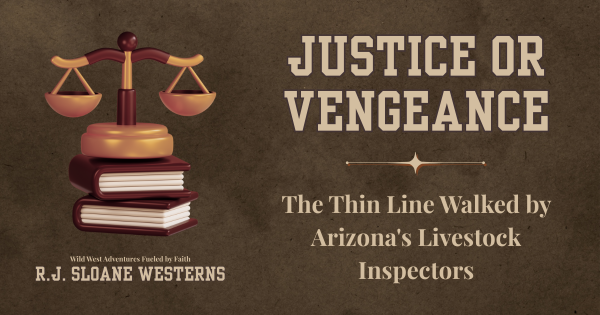Justice or Vengeance: The Thin Line Walked by Arizona's Livestock Inspectors

"That's not justice, Grady. That's vengeance."
"Maybe they're the same thing."
"No, they're not. Justice is about making things right, about protecting others from what happened to you. Vengeance is about making yourself feel better."
This exchange between Grady Thatcher and his partner Deacon, from my novel Blood Justice, captures the moral complexity that defined frontier law enforcement in 1890s Arizona Territory. For men like Grady, whose parents had been murdered by the very criminals he now hunted as a livestock inspector, the line between justice and vengeance wasn't just philosophical. It was personal, dangerous, and razor-thin.
When the System Wasn't Enough
By 1898, frustration with cattle theft had reached a breaking point across Arizona Territory. The official livestock inspection system, established in 1887 and expanded in 1891, wasn't stopping the organized gangs bleeding ranchers dry. The Phoenix Herald proposed a radical solution: allow cattlemen to organize secret "Cattlemen's Detective Associations" in each county, with detectives having "the power of deputy sheriffs in livestock matters."¹
The suggestion revealed how close the territory came to officially sanctioning frontier justice dispensed by men whose personal stakes ran deeper than professional duty. For every official livestock inspector like Tom Horn, who used "cold and calculated means" in his legendary career, there were others walking an even thinner line between law and lawlessness.
The Personal Stakes of Professional Lawmen
Frontier law enforcement attracted men carrying their own scores to settle. Grady Thatcher represented thousands of such men across the American West: those who wore badges not just from civic duty, but from a burning need to hunt down the kind of criminals who had destroyed their families.
"I want to kill him, Deacon," Grady admits when facing his parents' murderer. "I want to put a bullet in his head and watch him die. I want him to know fear the way my mother knew fear."
This wasn't unique to fiction. Historical records show that many livestock inspectors, deputy sheriffs, and territorial lawmen were motivated by personal loss. The job offered something irresistible: legal authority to hunt the exact type of men who had made them lawmen in the first place.
The danger wasn't just physical, though facing organized gangs with military precision and inside information often proved deadly. The real danger was moral. How do you hunt killers without becoming one? How do you pursue justice without crossing into vengeance?
The Cost of Hunting Monsters
The frontier blurred moral lines in ways that would be unthinkable in more settled regions. Limited legal infrastructure meant that sheriffs couldn't always cross county lines, judges might be days away, and witnesses could disappear before trials. The vast geography of Arizona Territory created countless opportunities for criminals to escape justice through legal technicalities.
In this environment, men like Grady Thatcher faced constant temptation to take shortcuts. When you know a man murdered your family, when you have him in your sights, when you're miles from the nearest courthouse, what stops you from becoming judge, jury, and executioner?
For some, the answer was partnership with methodical professionals who understood that "courtroom justice requires more than a strong suspicion and a fast draw." These partnerships balanced personal motivation with professional standards, channeling the desire for revenge into systematic investigation and legal procedure.
For others, the line disappeared entirely. When lawmen became as ruthless as the criminals they hunted, the territory gained order at the cost of its soul.
The Evolution from Vengeance to Justice
The livestock inspector system represented a crucial transition in Arizona's development from frontier chaos to civilized order. Unlike vigilante committees or secret detective associations, official inspectors had to build legal cases that would survive court challenges. They couldn't simply eliminate threats. They had to document crimes, preserve evidence, and work within the law.
This shift required a new breed of frontier lawman. Men who could match wits with sophisticated criminal networks while maintaining professional standards. Men who understood that lasting justice came through systematic investigation, not summary execution.
Grady's character arc in Blood Justice reflects this larger transformation. His journey from grief-driven revenge seeker to professional lawman represents the choice facing many frontier officers: Would they let personal pain drive them toward darkness, or channel that motivation into something that could protect others? This internal struggle between justice and vengeance is precisely why I chose the title Blood Justice—because Grady must decide whether to seek blood for blood, or true justice through the law.
The Harper Legacy: Transformation Through Justice
The broader Harper's Justice Series explores this theme through six siblings whose criminal father destroyed countless families. Rather than continuing his legacy of violence, they choose to become the very lawmen their father spent his life outrunning: Pinkerton agents, federal marshals, and territorial rangers hunting down men just like the one who raised them.
Their story embodies the series verse: "When justice is executed, it is a joy to the righteous but a terror to evildoers" (Proverbs 21:15 CSB). The Harper name, which once struck fear in honest folk across Arizona Territory, now strikes terror in outlaws. Their transformation proves that family legacy doesn't have to determine individual destiny, that men can choose justice over revenge even when they have every reason for bitterness.
¹ Phoenix Herald, 1898, as cited in Monty McCord, Calling the Brands-Stock Detectives of the Wild West (2020)
Experience Grady Thatcher's struggle between justice and vengeance in Blood Justice, where the moral complexity of frontier law enforcement plays out against the dangerous backdrop of territorial Arizona's cattle wars.